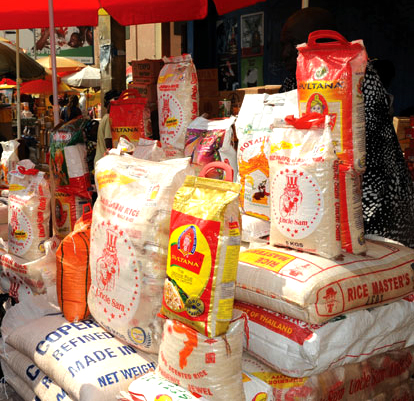I love rice – the cereal fast becoming the most irresistible staple in Ghana, where it is served in various forms, including the standard rice meals, rice porridge, omo tuo, rice kenkey, noodles, rice biscuits and many more.
So, I was not the least surprised when the National Rice Development Strategy (NRDS) for Ghana revealed some time ago that the per capital rice consumption in the country would shoot up to 63 kg this year – translating into an aggregate demand of 1.68 million metric tonnes. Boy, Ghanaians love rice!
[contextly_sidebar id=”NKCZKVizrqEZvLbrkeOwZCapj7sdWUOq”]I used to consider everyone engaged in the business of putting rice on my table as a friend ….until it was revealed last year, that the country loses as much as nearly GHc70 million every year, to illegal rice importation – mostly engineered by powerful and selfish smugglers through our porous land borders.
Until very recently, the basis of the argument put forward in support of land border importation of rice, was that the differentials in duties and taxes between Ghana and Ivory Coast (about 24.5 percent) made it profitable to import rice lawfully in any quantities from the Ivory Coast into Ghana.

The proponents of this argument even contended that the retail prices of such imports would be even cheaper than rice imported through officially designated import channels like the harbours.
In Ghana, importers using official or designated import channels pay a total of 37 percent in duties and taxes while their Ivorian counterparts have to pay just 12.5 percent. By way of defense for ‘legitimate’ cross-border importation of rice – if there was any – this was indeed a highly tenable argument.
Except that, over the years, this same element of tax differential has been observed to be the key incentive for the lucrative business of rice smuggling, especially across our western frontier. But what about cheaper rice? Can rice ‘imported’ across the land borders be any cheaper than regular rice imports? Indeed, you would occasionally chance upon some ‘special’ brands of rice selling on the markets at rock-bottom prices far less than the normal retail prices across board.
Revelation
I would have been taken in by these arguments if I had not chanced upon the findings of an official pilot project undertaken by the Ministry of Trade and Industry, which proves beyond doubt that it will be totally injudicious, if not impossible, for any importer to purchase rice from the Ivory Coast, legitimately pay all the requisite import –export duties and taxes for Ivory Coast and Ghana, haul the consignment into the Ghana market and sell at a profit.
So fallacious and deceptive too is the claim that rice imported in this way could sell ‘cheaper’ than that imported through the ports.
Seeking to test the veracity of arguments in support of rice importation through the Ivory Coast border, the Ministry of Trade and Industry, in its wisdom, conducted a trial overland importation exercise just last November, principally aimed at exploring the feasibility of legitimate commercial importation of rice across land borders – of course with all duties and taxes paid.

The Ministry set up its own team of overland ‘rice importers’, comprising a careful selection of respectable individuals from the Consumer Protection Agency, the Media and the Ministry of Trade and Industry and assigned it the mandate of simulating the importation of rice overland from the Ivorian capital Abidjan to Accra by paying up to the Customs Division of the Ghana Revenue Authority all relevant duties and taxes at the Elubo border post.
Observations of the Ministry’s ‘rice importers’ are reportedly revealing – having fallen victim to prevailing red tape and corrupt practices on either side of the border. After five days however, the team successfully cleared the consignment it bought in Abidjan – 1,200 bags of assorted rice – at the Elubo border.
A final report on the exercise indicates unequivocally that an analysis of the cost for the consignment and other related expenditure as legitimately incurred by the Ministry’s ‘importers’ shows that their rice definitely had to be sold at a comparatively higher price than prevailing market prices if they were to make even the barest margin of profit on their rice import.
The questions now being asked by concerned Ghanaians is that, if overland importation is so high-priced, so cumbersome and as prohibitive as the Ministry’s pilot has revealed, why is so much rice still coming from across our borders, selling at supposedly at cheaper, rock-bottom prices compared to rice imported through officially designated routes?
It will remain Ghana’s biggest commercial mystery of all times, if non-smugglers, importing rice from the Ivory Coast can pay that country’s 12.5 percent import tariff requirement and pay up Ghana’s 37.5 percent duty and tax and still be able to sell at a profit in a highly competitive rice market like ours.
It is true that I love my bowl of rice; but I sorely hate to think of the possibility that anytime I picked up my bag of rice from the shelves, I could be supporting an illicit enterprise which lines individual pockets at the expense of all of us. After that excellent pilot operation, I now wonder what the Ministry is bracing up for!
By: Paa Kofi Eyisah


